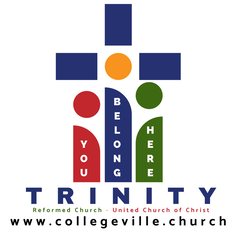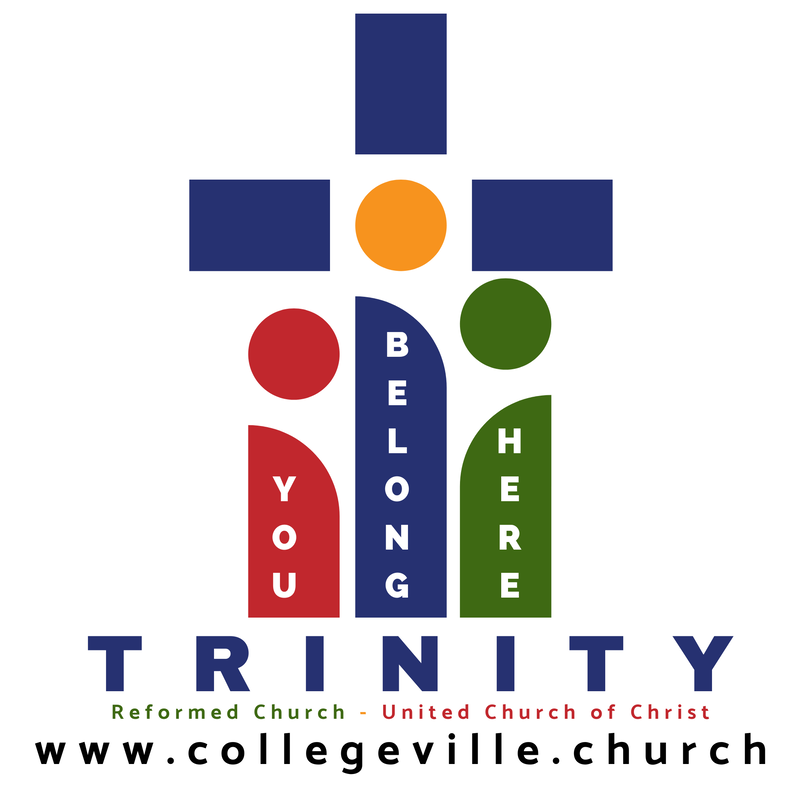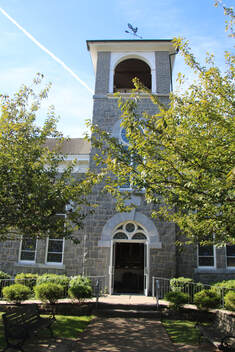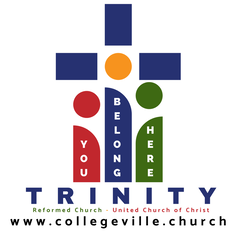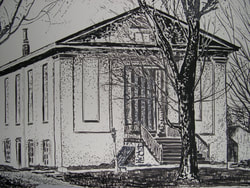
Trinity Church was organized in 1854 as a congregation and endures as a place of worship for all Christians.
It all began when a local farmer, Abraham Hunsickcker looked up the “turnpike” (now Main Street) to Trappe with its Lutheran Church that had a parochial school and was able to send students on to four colleges,and a seminary. He thought of his Mennonite forbearers building Skippackville (now Skippack) in 1702 and asked why they had no schools.
A question he answered by establishing a high school for boys, Freeland Seminary,and the Pennsylvania Female College for Girls. The former was located on the site of the Myrin Library and the college was on Glenwood Ave. Today a stone gazebo and a plaque mark the location.
Abraham’s progressive views toward education, his insistence that the Lord’s Table be open to all Christians regardless of the mode of their baptism, that a congregation be governed by rules of order and served by a pastor trained for the ministry, led to his expulsion from the historic Mennonite Meeting House at Skippack. At first his family and relatives worshiped in local churches, but by 1854 their number warranted building a meeting house at Freeland (Collegeville’s earlier name) for their “Christian Society,” open to all Christians.
Although he was raised to practice pacifism, the issue of slavery prompted him to send his son Henry to schools that championed its abolition. Under Henry’s leadership Freeland Seminary instilled the same conviction in its students and when war was declared, large numbers, along with faculty, left to join the Union Army. The price was a loss of enrollment,and eventually the seminary was sold in 1869 to members of the Reformed Church who wanted
to establish a college and seminary, Ursinus College. In 1881 the Female College was included, making the college coed.
The sale was more than a real estate transaction. The staff of the seminary stayed , the homes built by members of Trinity Church which make up today’s “residential village” along Collegeville’s Main Street passed on to the college to house students and faculty. The church welcomed students and staff to church school and worship, and until Bomberger Hall was built assemblies, commencement, and classes of the religion department were held at Trinity. The relationship was so good that in 1888 the congregation voted to be accepted into the Reformed
Church, and the first six pastors have been graduates of Ursinus College and a seminary of the denomination.
A congregation of, by, and for the community gave a tangible expression to that commitment in 1922 when an addition honoring Dr. Hendricks’ 43 years of ministry was built to house community gatherings and the first movie theater. To this day the facilities serve to maintain that intention which expands to these endeavors.
We invite you to come live a sacramental life being in the faith and family of Jesus Christ nurtured and nourished in worship to be a servant church of the servant Christ.
It all began when a local farmer, Abraham Hunsickcker looked up the “turnpike” (now Main Street) to Trappe with its Lutheran Church that had a parochial school and was able to send students on to four colleges,and a seminary. He thought of his Mennonite forbearers building Skippackville (now Skippack) in 1702 and asked why they had no schools.
A question he answered by establishing a high school for boys, Freeland Seminary,and the Pennsylvania Female College for Girls. The former was located on the site of the Myrin Library and the college was on Glenwood Ave. Today a stone gazebo and a plaque mark the location.
Abraham’s progressive views toward education, his insistence that the Lord’s Table be open to all Christians regardless of the mode of their baptism, that a congregation be governed by rules of order and served by a pastor trained for the ministry, led to his expulsion from the historic Mennonite Meeting House at Skippack. At first his family and relatives worshiped in local churches, but by 1854 their number warranted building a meeting house at Freeland (Collegeville’s earlier name) for their “Christian Society,” open to all Christians.
Although he was raised to practice pacifism, the issue of slavery prompted him to send his son Henry to schools that championed its abolition. Under Henry’s leadership Freeland Seminary instilled the same conviction in its students and when war was declared, large numbers, along with faculty, left to join the Union Army. The price was a loss of enrollment,and eventually the seminary was sold in 1869 to members of the Reformed Church who wanted
to establish a college and seminary, Ursinus College. In 1881 the Female College was included, making the college coed.
The sale was more than a real estate transaction. The staff of the seminary stayed , the homes built by members of Trinity Church which make up today’s “residential village” along Collegeville’s Main Street passed on to the college to house students and faculty. The church welcomed students and staff to church school and worship, and until Bomberger Hall was built assemblies, commencement, and classes of the religion department were held at Trinity. The relationship was so good that in 1888 the congregation voted to be accepted into the Reformed
Church, and the first six pastors have been graduates of Ursinus College and a seminary of the denomination.
A congregation of, by, and for the community gave a tangible expression to that commitment in 1922 when an addition honoring Dr. Hendricks’ 43 years of ministry was built to house community gatherings and the first movie theater. To this day the facilities serve to maintain that intention which expands to these endeavors.
We invite you to come live a sacramental life being in the faith and family of Jesus Christ nurtured and nourished in worship to be a servant church of the servant Christ.
